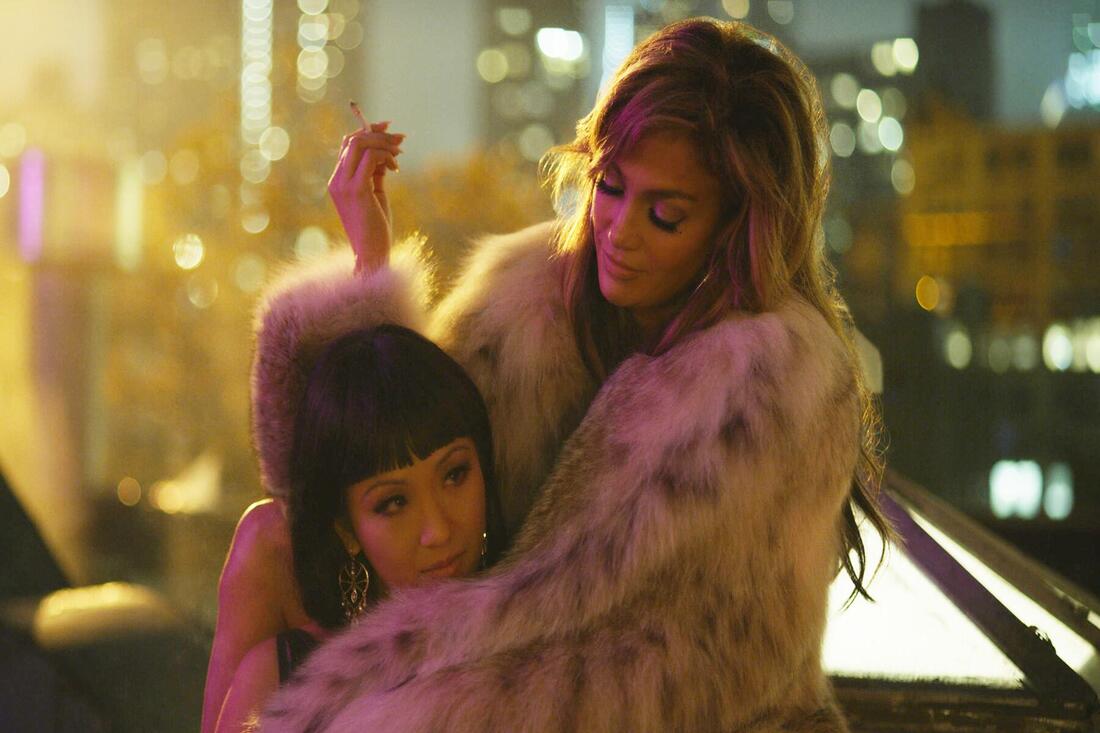The relationship between Ramona and Dorothy is a pairing that separates Hustlers from the films it’s ripping off. Until The Irishman, Scorsese’s crime films never had a relationship this reciprocal and genuine. Ramona and Dorothy are immediately recognizable as a pair of sisters with a several-year age gap, where the latter idolizes the former and the former loves the latter all the more for it. The way Dorothy stares up at Ramona while she’s dancing says everything about how she feels about her mentor. Scafaria and cinematographer Todd Banhazl construct plenty of stunning tableaus in Hustlers, and the most notable is of Ramona on the roof after a shift, luxuriating in a fur and smoking a cigarette. She invites Dorothy to curl up in her coat, and the viewer can practically hear the purring from whatever animal the coat was made from. Hustlers has so much affection for these women that it shades into the indulgent, particularly in a Christmas scene that goes on for a long time. This kinetic film slows down to watch its characters give gifts to each other, a statement of principles in a movie without many of them.
Like any good Scorsese homage, Hustlers contains explanatory narration about the inner workings of whatever’s being depicted onscreen. In most movies, this is a negative, but Scorsese and those that competently imitate him have cracked the code on it and made it palatable. As Dorothy talks about her deeds and her self-justification, it becomes clear that what she’s involved in an extractive enterprise. Instead of oil or gold, she and her fellows are mining for cash from a vein that seems like it will never run dry. Like extractive industries, corruption abounds, middlemen leap out of the woodwork, and the boom and bust cycle reigns. So there’s a little bit of foggy chaos in the form of large holes in a credit statement. It’s not like the top of a mountain has been lopped off, or a shaky lake of coal sludge has been abandoned in the hopes a heavy rain won’t cause a toxic landslide. Hustlers evokes shady industries while stealing directly from participants in shady enterprises.
For Scafaria’s third film, she is far away from her earlier work in Seeking a Friend for the End of the World and The Meddler. This is a flashy film with the set pieces to match. She apes Scorsese’s long tracking shots, following right behind a character as they make their way through a strip club or a humiliating school drop-off line, and she’s handy with a montage or the gauzy slo-mo nirvana of Usher’s aforementioned visit. Appreciably, there’s no leering or lingering shots of her actors despite taking place in the sex industry, and she includes what feels like the conscious choice of movers lugging a tanning bed into an apartment, like the film’s making a comment on the arbitrary nature of what kind of physical labor is viewed as acceptable or unacceptable.
Where Scafaria is most successful is in her work with Lopez, who turns in a career-best performance. Just as the McConaissance kicked off with its subject playing a stripper’s stripper, so too do we welcome the Lopez equivalent. She towers over the film, worthy of deference and fear as the stakes continue to rise. Hustlers contains several shots of Ramona leading her girls into a bar, eager to dive in and snag a new mark, and the film could credibly contain a dozen more because every one of them is compelling and seductive and powered by Lopez’s indomitability. Her physical mastery of the role is a feat of sheer charisma, with every piece of body language and motion in control.
Less successful is Wu in a part that can’t decide what kind of audience surrogate it wants to be. Dorothy is introduced as a working stripper, but she comes to Moves and asks questions like she’s a rookie, likely so the film could contain a scene of Ramona running down the basics of pole dancing. Scafaria feels the need to explain the basics of strip clubs and dancing, despite the fact that the film’s going to leave that part of the world behind after its first act. The choice to falsely make Dorothy into a wide-eyed naif dumbs down the character, and a further unwillingness to fill in gaps between the scam and the present day (whose suburban house is she in, what is she doing now, etc) marks her as a vehicle for narration instead of an actual person. Wu has excellent comic timing and can be a strong straight woman, and the film gives her opportunities to flex those muscles, but it doesn’t flesh out a character who’s supposed to be the lead.
Even with an unmoored anchor as a protagonist, Hustlers’ numerous charms keep this pleasure yacht moving forward. One doesn’t have to feel as bad sympathizing with, if not outright rooting for, Scafaria’s schemers compared to the gangsters and reckless addicts of Scorsese’s films. Hustlers locates a still-simmering anger at those behind the financial collapse. Though it takes pains to show them as perhaps not deserving of being drugged and robbed, the film can’t help but delight in the tables being turned. Scafaria could’ve reasonably made this film about any profession downstream of a Goldman Sachs trading floor, whether their secretaries or their tailors or their drug dealers. Finance has made money so meaningless that whoever can put their hand in a financier’s pocket is doing the lord’s work. If these people make effective tax rates impossible, then why not just rob them? If Scafaria can do good stealing from Scorsese, so can the maids of coked-out short-sellers by pocketing a pair of diamond cuff links. B

 RSS Feed
RSS Feed